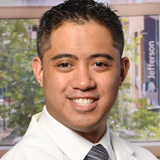
Regional Anesthesia/Acute Pain Management
College
- Center City Campus
- Sidney Kimmel Medical College
Degree Earned
- Fellowship
Program Length
1 year
Program Type
- On Campus
Leadership
Program Information
111 South Eleventh Street
Suite 8290
Philadelphia, PA 19107
The Department of Anesthesiology offers an ACGME accredited Regional Anesthesia and Acute Pain Management Fellowship position starting in July of each year. Two annual fellowship positions are available and are open to national competition.
Application Information
ACGME residency candidates may apply via SF Match. We are an accredited J1B and H1B visa institution.
Candidate Requirements
- A valid Pennsylvania medical license
- Graduation from an ACGME residency
Interested applicants may contact the Program Coordinator. Contact information is available on this page.
Clinical Program Description
Thomas Jefferson University hospital is affiliated with the Rothman Orthopedic Institute, a world class orthopedic surgical program. Through this partnership, the Department cares for thousands of orthopedic patients, specializing in spine surgery, hip surgery, shoulder surgery, and knee surgery. Our regional anesthesia service covers all peripheral blocks, truncal blocks, and neuraxial anesthesia outside of the OB suite.
Educational Program Description
Program Goals
Our goal is to develop expert consultants in the subspecialty. Working with our team of innovative, nationally recognized, Regional and Acute Pain Medicine service; the fellow will:
- gain proficiency in the application of a wide variety of blocks for surgical anesthesia and pain management, including cutting-edge truncal blocks and modern regional anesthesia techniques
- learn to manage analgesic infusions for acute pain management, such as ketamine and lidocaine
- gain experience with buprenorphine and the complexities of hospitalized patients with opioid use disorder and chronic pain disorder
- develop the technical, interpersonal, communication, and systems-based practice skills necessary to become an expert consultant in regional anesthesia and acute pain.
- gain proficiency in the operation management of an acute pain medicine service and management of the complex acute pain patient
- Develop the technical, interpersonal, communication, and systems-based practice skills necessary to become an expert consultant in regional anesthesia and acute pain.
- Proficiency in the application of a wide variety of blocks for surgical anesthesia and pain management including:
- the upper and lower extremity (including continuous catheter techniques)
- the superficial cervical plexus
- intercostal nerve block
- intravenous regional anesthesia
- spinal anesthesia
- epidural anesthesia
- combined spinal epidural (CSE)
- thoracic and lumbar paravertebral
- truncal blocks, including but not limited to erector spinae plane block, transversus abdominus plane block, pectoralis block, quadratus lumborum block
- Proficiency in the operation management of an acute pain medicine service and management of the complex acute pain patient
- In- depth knowledge of:
- anatomy of nerves
- the pharmacology of local anesthetics
- Pharmacology of opioids including buprenorphine
- Buprenorphine induction
- the pharmacology of adjuvants to local anesthetics for peripheral nerve blocks and neuraxial blocks
- neuraxial opioids
- complications of regional anesthesia and their treatment
- multimodal analgesia, including non-steroidal anti-inflammatory drugs, gabapentinoids, acetaminophen, ketamine, lidocaine, opioids
- Management of acute pain in the presence of opioid use disorder, chronic opioid use, chronic pain
- Fellows will be exposed to anatomic dissection to enhance their understanding of blind procedures and spatial relationships
- Each fellow will participate in a research project
Clinical Rotations
The cornerstone of the year is participation on the block team serving all anesthetizing locations in the main hospital. Additionally, the fellowship can be structured to meet the individual's career goals as long as all ACGME requirements are met. This could include a focus on research, quality improvement, or exposure to broader clinical opportunities such as obstetric anesthesia/analgesia.
Didactic Curriculum/Conferences
The Didactic program includes Morbidity and Mortality Conference and Anesthesiology Grand Rounds.
Scholarly Activity/Research
The fellow will design and implement ideas to participate in at least one clinical, laboratory, or database research project during the year. In addition, the fellow will gain experience by participating in ongoing clinical trials within the division. The fellow will be supported to attend and participate in multiple local, regional, and national meetings along with the ability to submit abstracts and/or papers at other meetings presentations. The fellow is expected tp present a departmental Grand Rounds on a topic of his or her choosing in the spring.
Clinical Faculty
-

Director, Regional Anesthesia
Clinical Assistant Professor Email Jaime Baratta 215-955-6161 -

Clinical Assistant Professor Email David Beausang 215-955-6161
-

Assistant Professor Email Eric Feduska 215-955-6161
-

Clinical Assistant Professor Email Stephen Goldberg 215-955-6161
-

Assistant Professor Email Deepti Harshavardhana 215-955-6161
-

Clinical Assistant Professor Email Jeffrey Mojica
-

Professor
Director, Acute Pain Management Service
Director, Orthopedic Anesthesia Email Eric Schwenk 215-955-6161 -

Clinical Assistant Professor Email John Wenzel 215-955-6161
-

Clinical Assistant Professor Email Thomas Witkowski 215-955-7025

